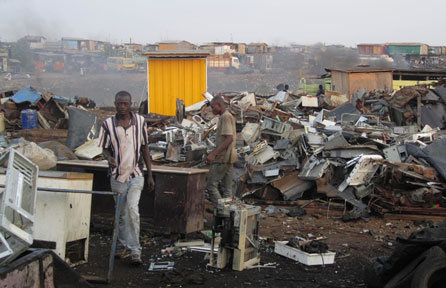Urgent call to deal with toxic residues from electronic waste
An international scientific expert has called for an urgent global
effort to save the coming generation of children from being poisoned by
toxic residues from the world's ever-growing garbage pile of old mobile
phones, computers and electronic devices.
“Electronic waste (or e-waste) is the world's fastest growing waste
stream, rising by 3-5 percent every year, due to the decreased lifespan
of the average computer from six years to two,” says Prof. Ming Hung
Wong of Hong Kong Baptist University.
 “In countries such as Australia the disposal of e-waste in landfills
generates a potent leachate, which has high concentrations of flame
retardant chemicals and heavy metals. These can migrate through soils
and groundwater and eventually reach people via tap water and the food
chain.” Prof. Wong will deliver a keynote paper at CleanUp 2013, the
world's leading scientific contamination conference, which is being held
in Melbourne. “In countries such as Australia the disposal of e-waste in landfills
generates a potent leachate, which has high concentrations of flame
retardant chemicals and heavy metals. These can migrate through soils
and groundwater and eventually reach people via tap water and the food
chain.” Prof. Wong will deliver a keynote paper at CleanUp 2013, the
world's leading scientific contamination conference, which is being held
in Melbourne.
In many countries in Asia and Africa, e-waste from advanced nations
is being recycled under extremely primitive conditions which lead to
extensive pollution of air, water, food and people, he says. Gradually
these toxins make their way around the world in food and water and via
trade, posing a risk to everyone.
“The toxic chemicals generated through open burning of e-waste
include PCDD, PBDEs, PAHs, PCBs and heavy metals (especially lead) have
given rise to serious environmental contamination. “Some of these toxic
chemicals are known to build up in fish especially, which may then be
traded locally and around the world.
In general, any food items originating in e-waste processing areas
are highly contaminated, leading to sharp increases in cancers and heart
disease and other ailments in people who consume them.” Prof. Wong says
that science has now clearly demonstrated the risk of these toxic
chemicals being passed on to the next generation, while babies are still
in the womb, or in their mother's milk. “At the same time these e-waste
contaminated sites are extremely hard to clean up due to the complex
chemical mixtures they contain.
However the time may soon be coming when developing countries will no
longer accept e-waste from consumers in developed countries - and every
nation will have to take care of its own.
“It is clear there is an urgent need to manage e-waste more
efficiently in all countries and through better international
collaboration.”
Total world e-waste production has been estimated as high as 50
million tonnes a year, and is a growing component of the world's
estimated annual output of 400 million tonnes of hazardous waste, only a
small fraction of which is safely disposed.
- Medicalxpress
|

